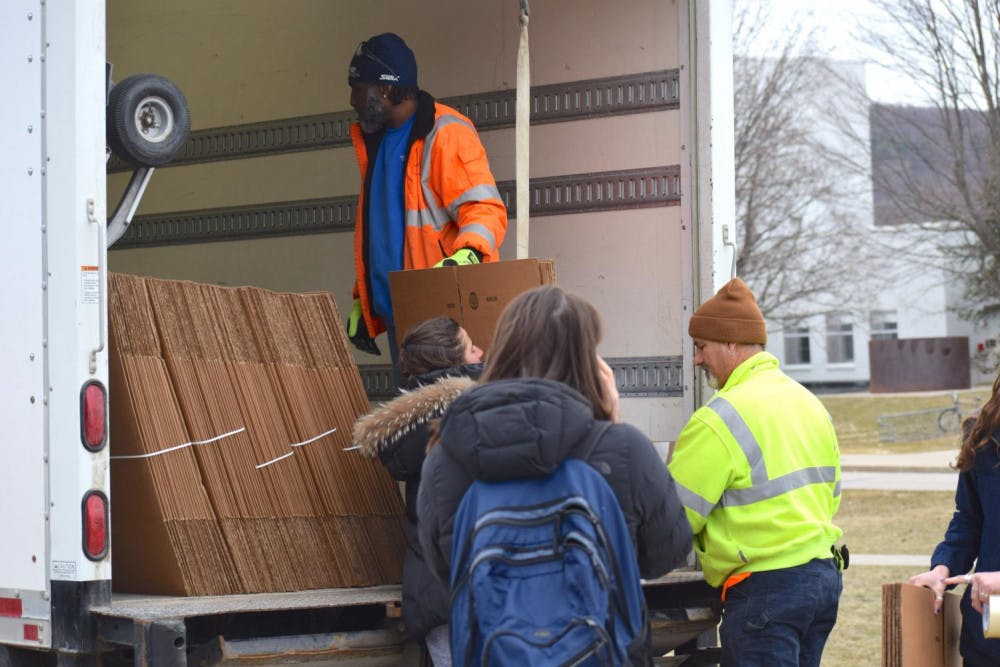Editor's Note: On April 7, the college committed to continuing staff wages through June 30, 2020, regardless of an employees' accrued time off, through the Covid Pay Bank, or sick leave.
As storefronts and institutions shutter their doors to ward off the spread of Covid-19, thousands of employees are being laid off across the country. At Middlebury — the largest employer in Addison County — the college’s crisis management team has developed a roadmap for maintaining staff wages after most students departed during the unfolding pandemic.
The plan, shared with the community in an email Wednesday, outlines the college’s goal of continuing both staff work and compensation in the coming months, laying out nine “tenets” in support of this objective. This commitment to pay staff in full will “continue to be evaluated on a month-to-month” basis, according to the email.
For many Middlebury employees, from groundskeepers to cooks, employment revolves around the 2,500 students who typically reside on campus. With fewer than 140 students now remaining in the dormitories, much of that work is dissipating. Moreover, the college expects to refund students for these unused services, which creates a gap in financing.
“We are committed to wage continuity as our first priority for as long as possible,” said Executive Vice President for Finance and Administration David Provost in an email to The Campus. “We are doing this knowing that we will be making a significant refund for unused dining and room charges, an obligation that reflects our commitment to our students.”
The commitment to continue paying staff applies to all benefits-eligible employees, meaning both full-time workers and workers who work at least 50%, plus one hour, of a full-time schedule.
Examples of part-time workers excluded under the plan are high school students who work a limited number of hours in the dining halls, according to Provost.
The college’s response to the dwindled demand for certain services is to move some employees into different jobs. As of now, there are around 70 dining employees who will soon be temporarily transferred to facilities. These employees’ work will focus on deep-cleaning college buildings and landscaping, according to Sarah Ray, the director of media relations for the college.
Patti McCaffrey, a cook in Atwater dining hall, is one of these employees who will be moving to work with the custodial team. She said that in the past week, the dining staff cleaned Atwater as she had never seen it cleaned before. Usually, they clean tabletops and floors. This time, they were also disinfecting chair legs and walls. “Usually we mop the floor, but we don’t usually do walls,” she said. “This time we did.”
Some employees expressed worry about continuing with business as usual during a health crisis. One staff member, who spoke on condition of anonymity for fear of retribution from management, cited having a child at home with respiratory problems as a reason for their concern. They fear that continuing to work on campus will put their family at risk.

“All the people who can’t work from home, they are expected to be here, working every day,” they said. “That’s not really safe for us. I have family members who are extremely vulnerable to this virus. I’d much rather be at home with them.”
The staff member said the college has yet to provide protective gear for employees who are still reporting to work on campus. McCaffrey says employees are wearing gloves as usual, but that she suspects masks will be provided if the situation at the college becomes severe.
“We have to feed these remaining students somehow,” she said. “Even if it gets so bad that we’re pre-boxing food and leaving it at their doors. That’s when they’ll probably have us wearing masks.”
The college’s plan also provides a so-called Covid-19 Pay Bank. This bank gives staff an additional 21 sick days to stay home if they or a family member becomes ill with the virus. Staff can use the four weeks without dipping into their regular banks of sick days.
Middlebury’s staff plan for the viral crisis is comparable to other colleges’ plans--and in many cases, it is more generous. Tufts University has committed to pay employees if they need to quarantine, but did not specify how many days they will grant full compensation. Bowdoin College will assess compensation on a case-by-case basis, and advised staff to contact their supervisors for additional information if they become sick.
But staff are now facing another dilemma: childcare, which has long been in high demand in Addison County, even in the best of times. “While I appreciate that [the Pay Bank] is 21 days, the only issue I have is now I have to make the decision to use it in order to take care of my kids or save it in case I get sick,” said Erin Jones-Poppe, the college bookstore manager.
In accordance with Vermont’s mandate to close all “non-essential” childcare facilities, many daycare centers in the Middlebury area have stopped operating.
Otter Creek Child Center in Middlebury closed on Tuesday, March 17. The daycare only had 11 kids on the final day of operation, according to its executive director, Linda January. The center usually has 45.
“I haven’t received any pushback from family members,” January said. “Most families opted to keep their children home before we even closed. They get it.”
The college’s outreach to the wider community also holds uncertainty for staff. In an open letter to the community co-written with other community leaders, President Patton offered some of the college’s infrastructure — such as buildings — as local officials prepare for the worst.
President Patton said the college had already drained the ice hockey rink so that the arena could be used as a “portable hospital, if necessary” during an interview with the Addison Independent. As coordination between the hospital and the college is still in the planning stage, it is at this point unclear how the relationship might impact Middlebury staff’s responsibilities.
Although administrators are already in communication with local health officials, Provost clarified that no staff member would be required to work if there is future collaboration with Porter Hospital. He insisted that the college would only ask staff members to help if needed.
“From my perspective, I think the college is really going to bat for staff and trying to do what they can," McCaffrey said. "When I look at neighbors having to file for unemployment, I feel pretty good about what the college is doing.”
The college’s ‘first priority’: continuing staff wages

BENJY RENTON/THE MIDDLEBURY CAMPUS
College employees were all-hands-on-deck as students were asked to move out mid-semester due to Covid-19.
College employees were all-hands-on-deck as students were asked to move out mid-semester due to Covid-19.
ERICA BISAILLON/COURTESY PHOTO
Comments



